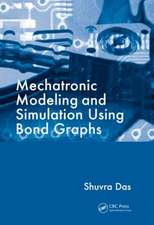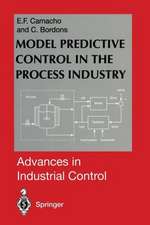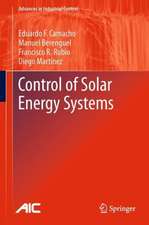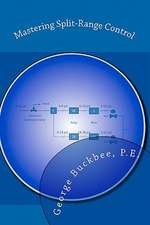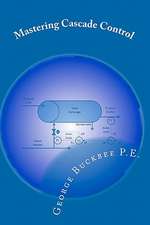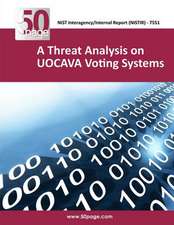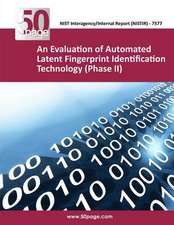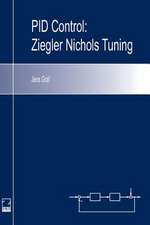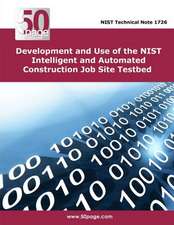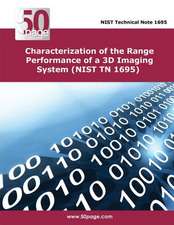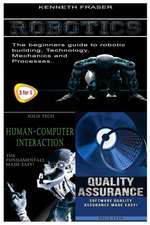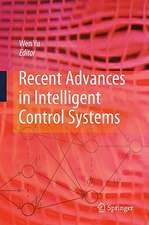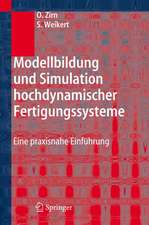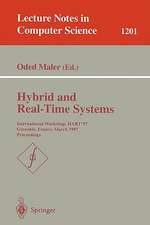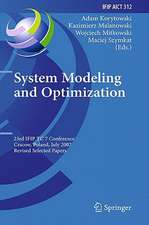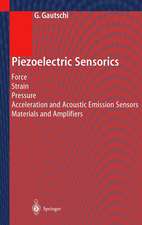Model Predictive Control: Advanced Textbooks in Control and Signal Processing
Autor Eduardo F. Camacho, Carlos Bordons Albaen Limba Engleză Paperback – 16 iun 2004
All of the material is thoroughlyupdated for the second edition with the chapters on nonlinear MPC, MPC andhybrid systems and MPC implementation being entirely new. Many new exercisesand examples have also have also been added throughout and MATLAB® programsto aid in their solution can be downloaded from extras.springer.com.The text is an excellent aid for graduate and advanced undergraduate studentsand will also be of use to researchers and industrial practitioners wishing tokeep abreast of a fast-moving field.
Din seria Advanced Textbooks in Control and Signal Processing
- 15%
 Preț: 659.35 lei
Preț: 659.35 lei -
 Preț: 375.68 lei
Preț: 375.68 lei - 15%
 Preț: 593.42 lei
Preț: 593.42 lei - 15%
 Preț: 616.31 lei
Preț: 616.31 lei - 18%
 Preț: 991.55 lei
Preț: 991.55 lei - 20%
 Preț: 572.72 lei
Preț: 572.72 lei - 15%
 Preț: 502.22 lei
Preț: 502.22 lei -
 Preț: 393.90 lei
Preț: 393.90 lei - 15%
 Preț: 499.26 lei
Preț: 499.26 lei -
 Preț: 394.29 lei
Preț: 394.29 lei - 15%
 Preț: 582.30 lei
Preț: 582.30 lei -
 Preț: 358.79 lei
Preț: 358.79 lei - 15%
 Preț: 652.49 lei
Preț: 652.49 lei -
 Preț: 396.02 lei
Preț: 396.02 lei -
 Preț: 396.40 lei
Preț: 396.40 lei - 15%
 Preț: 505.83 lei
Preț: 505.83 lei - 19%
 Preț: 564.48 lei
Preț: 564.48 lei - 20%
 Preț: 333.72 lei
Preț: 333.72 lei -
 Preț: 402.00 lei
Preț: 402.00 lei - 15%
 Preț: 502.22 lei
Preț: 502.22 lei - 15%
 Preț: 658.05 lei
Preț: 658.05 lei - 15%
 Preț: 592.95 lei
Preț: 592.95 lei -
 Preț: 392.75 lei
Preț: 392.75 lei - 23%
 Preț: 669.20 lei
Preț: 669.20 lei - 19%
 Preț: 475.27 lei
Preț: 475.27 lei - 19%
 Preț: 531.49 lei
Preț: 531.49 lei - 19%
 Preț: 535.15 lei
Preț: 535.15 lei - 15%
 Preț: 711.40 lei
Preț: 711.40 lei - 15%
 Preț: 474.82 lei
Preț: 474.82 lei -
 Preț: 390.46 lei
Preț: 390.46 lei -
 Preț: 391.99 lei
Preț: 391.99 lei - 15%
 Preț: 532.05 lei
Preț: 532.05 lei - 15%
 Preț: 506.48 lei
Preț: 506.48 lei - 15%
 Preț: 597.01 lei
Preț: 597.01 lei - 21%
 Preț: 467.48 lei
Preț: 467.48 lei
Preț: 460.72 lei
Preț vechi: 555.08 lei
-17% Nou
Puncte Express: 691
Preț estimativ în valută:
88.16€ • 94.27$ • 73.51£
88.16€ • 94.27$ • 73.51£
Carte disponibilă
Livrare economică 28 martie-11 aprilie
Livrare express 13-19 martie pentru 36.31 lei
Preluare comenzi: 021 569.72.76
Specificații
ISBN-13: 9781852336943
ISBN-10: 1852336943
Pagini: 427
Ilustrații: XXII, 405 p.
Dimensiuni: 155 x 235 x 27 mm
Greutate: 0.6 kg
Ediția:2nd ed. 2004
Editura: SPRINGER LONDON
Colecția Springer
Seria Advanced Textbooks in Control and Signal Processing
Locul publicării:London, United Kingdom
ISBN-10: 1852336943
Pagini: 427
Ilustrații: XXII, 405 p.
Dimensiuni: 155 x 235 x 27 mm
Greutate: 0.6 kg
Ediția:2nd ed. 2004
Editura: SPRINGER LONDON
Colecția Springer
Seria Advanced Textbooks in Control and Signal Processing
Locul publicării:London, United Kingdom
Public țintă
GraduateCuprins
1 Introduction to Model Predictive Control.- 1.1 MPC Strategy.- 1.2 Historical Perspective.- 1.3 Industrial Technology.- 1.4 Outline of the Chapters.- 2 Model Predictive Controllers.- 2.1 MPC Elements.- 2.2 Review of Some MPC Algorithms.- 2.3 State Space Formulation.- 3 Commercial Model Predictive Control Schemes.- 3.1 Dynamic Matrix Control.- 3.2 Model Algorithmic Control.- 3.3 Predictive Functional Control.- 3.4 Case Study: A Water Heater.- 3.5 Exercises.- 4 Generalized Predictive Control.- 4.1 Introduction.- 4.2 Formulation of Generalized Predictive Control.- 4.3 The Coloured Noise Case.- 4.4 An Example.- 4.5 Closed-Loop Relationships.- 4.6 The Role of the T Polynomial.- 4.7 The P Polynomial.- 4.8 Consideration of Measurable Disturbances.- 4.9 Use of a Different Predictor in GPC.- 4.10 Constrained Receding Horizon Predictive Control.- 4.11 Stable GPC.- 4.12 Exercises.- 5 Simple Implementation of GPC for Industrial Processes.- 5.1 Plant Model.- 5.2 The Dead Time Multiple of the Sampling Time Case.- 5.3 The Dead Time Nonmultiple of the Sampling Time Case.- 5.4 Integrating Processes.- 5.5 Consideration of Ramp Setpoints.- 5.6 Comparison with Standard GPC.- 5.7 Stability Robustness Analysis.- 5.8 Composition Control in an Evaporator.- 5.9 Exercises.- 6 Multivariable Model Predictive Control.- 6.1 Derivation of Multivariable GPC.- 6.2 Obtaining a Matrix Fraction Description.- 6.3 State Space Formulation.- 6.4 Case Study: Flight Control.- 6.5 Convolution Models Formulation.- 6.6 Case Study: Chemical Reactor.- 6.7 Dead Time Problems.- 6.8 Case Study: Distillation Column.- 6.9 Multivariable MPC and Transmission Zeros.- 6.10 Exercises.- 7 Constrained Model Predictive Control.- 7.1 Constraints and MPC.- 7.2 Constraints and Optimization.- 7.3 Revision of Main Quadratic Programming Algorithms.- 7.4 Constraints Handling.- 7.5 1-norm.- 7.6 Case Study: A Compressor.- 7.7 Constraint Management.- 7.8 Constrained MPC and Stability.- 7.9 Multiobjective MPC.- 7.10 Exercises.- 8 Robust Model Predictive Control.- 8.1 Process Models and Uncertainties.- 8.2 Objective Functions.- 8.3 Robustness by Imposing Constraints.- 8.4 Constraint Handling.- 8.5 Illustrative Examples.- 8.6 Robust MPC and Linear Matrix Inequalities.- 8.7 Closed-Loop Predictions.- 8.8 Exercises.- 9 Nonlinear Model Predictive Control.- 9.1 Nonlinear MPC Versus Linear MPC.- 9.2 Nonlinear Models.- 9.3 Solution of the NMPC Problem.- 9.4 Techniques for Nonlinear Predictive Control.- 9.5 Stability and Nonlinear MPC.- 9.6 Case Study: pH Neutralization Process.- 9.7 Exercises.- 10 Model Predictive Control and Hybrid Systems.- 10.1 Hybrid System Modelling.- 10.2 Example: A Jacket Cooled Batch Reactor.- 10.3 Model Predictive Control of MLD Systems.- 10.4 Piecewise Affine Systems.- 10.5 Exercises.- 11 Fast Methods for Implementing Model Predictive Control.- 11.1 Piecewise Affinity of MPC.- 11.2 MPC and Multiparametric Programming.- 11.3 Piecewise Implementation of MPC.- 11.4 Fast Implementation of MPC forUncertain Systems.- 11.5 Approximated Implementation for MPC.- 11.6 Fast Implementation of MPC and Dead Time Considerations.- 11.7 Exercises.- 12 Applications.- 12.1 Solar Power Plant.- 12.2 Pilot Plant.- 12.3 Model Predictive Control in a Sugar Refinery.- 12.4 Olive Oil Mill.- 12.5 Mobile Robot.- A Revision of the Simplex Method.- A.1 Equality Constraints.- A.2 Finding an Initial Solution.- A.3 Inequality Constraints.- B Dynamic Programming and Linear Quadratic Optimal Control.- B.1 LinearQuadratic Problem.- B.2 InfiniteHorizon.- References.
Recenzii
From the reviews of the second edition:
"This text is an introduction to model predictive control, a control methodology which has encountered some success in industry, but which still presents many theoretical challenges. … The book is of interest as an introduction to model predictive control, and a merit is the special presentation, connecting the subject intimately with industrial situations." (A. Akutowicz, Zentralblatt MATH, Vol. 1080, 2006)
"It is a much more ambitious work, seeking to inform practitioners how to implement MPC while at the same time serving as an advanced student text as well as reference for control researchers. … The authors clearly see the text as a teaching aid since several chapters include exercises. … In summary, a significant contribution to this important field for control academics, and some highly experienced MPC practitioners … ." (Michael Brisk, www.tcetoday.com, February, 2008)
"This text is an introduction to model predictive control, a control methodology which has encountered some success in industry, but which still presents many theoretical challenges. … The book is of interest as an introduction to model predictive control, and a merit is the special presentation, connecting the subject intimately with industrial situations." (A. Akutowicz, Zentralblatt MATH, Vol. 1080, 2006)
"It is a much more ambitious work, seeking to inform practitioners how to implement MPC while at the same time serving as an advanced student text as well as reference for control researchers. … The authors clearly see the text as a teaching aid since several chapters include exercises. … In summary, a significant contribution to this important field for control academics, and some highly experienced MPC practitioners … ." (Michael Brisk, www.tcetoday.com, February, 2008)
Textul de pe ultima copertă
From power plants to sugar refining, model predictive control (MPC) schemes have established themselves as the preferred control strategies for a wide variety of processes.
The second edition of Model Predictive Control provides a thorough introduction to theoretical and practical aspects of the most commonly used MPC strategies. It bridges the gap between the powerful but often abstract techniques of control researchers and the more empirical approach of practitioners. Model Predictive Control demonstrates that a powerful technique does not always require complex control algorithms.
The text features material on the following subjects:
The second edition of Model Predictive Control provides a thorough introduction to theoretical and practical aspects of the most commonly used MPC strategies. It bridges the gap between the powerful but often abstract techniques of control researchers and the more empirical approach of practitioners. Model Predictive Control demonstrates that a powerful technique does not always require complex control algorithms.
The text features material on the following subjects:
- general MPC elements and algorithms;
- commercial MPC schemes;
- generalized predictive control
- multivariable, robust, constrained nonlinear and hybrid MPC;
- fast methods for MPC implementation;
- applications.
Caracteristici
Provides an approach to control that is more pragmatic than the complex schemes common in academic research while maintaining the power necessary for a robust approach to a wide variety of processes and systems New exercises and examples give the student more practice in the modelling techniques presented Solutions available for download from authors' website save the tutor time and enable the student to follow results more closely even when the tutor isn't present Gives the student access to a widely-used form of control which will be required by many industrial careers


